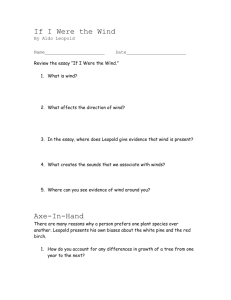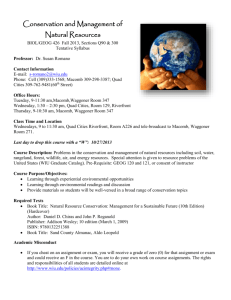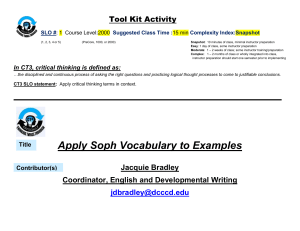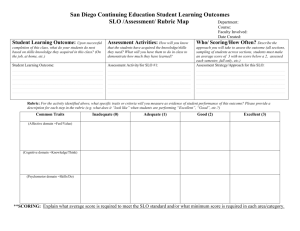BIOL/GEOG 426: Conservation and Management of Natural
advertisement
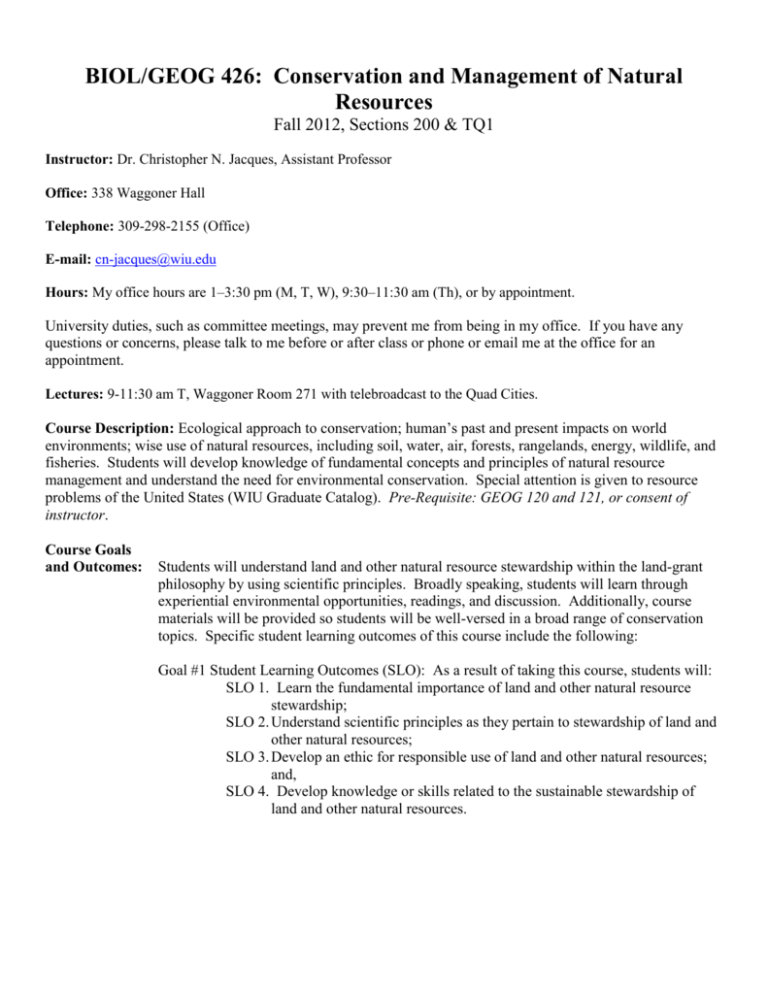
BIOL/GEOG 426: Conservation and Management of Natural Resources Fall 2012, Sections 200 & TQ1 Instructor: Dr. Christopher N. Jacques, Assistant Professor Office: 338 Waggoner Hall Telephone: 309-298-2155 (Office) E-mail: cn-jacques@wiu.edu Hours: My office hours are 1–3:30 pm (M, T, W), 9:30–11:30 am (Th), or by appointment. University duties, such as committee meetings, may prevent me from being in my office. If you have any questions or concerns, please talk to me before or after class or phone or email me at the office for an appointment. Lectures: 9-11:30 am T, Waggoner Room 271 with telebroadcast to the Quad Cities. Course Description: Ecological approach to conservation; human’s past and present impacts on world environments; wise use of natural resources, including soil, water, air, forests, rangelands, energy, wildlife, and fisheries. Students will develop knowledge of fundamental concepts and principles of natural resource management and understand the need for environmental conservation. Special attention is given to resource problems of the United States (WIU Graduate Catalog). Pre-Requisite: GEOG 120 and 121, or consent of instructor. Course Goals and Outcomes: Students will understand land and other natural resource stewardship within the land-grant philosophy by using scientific principles. Broadly speaking, students will learn through experiential environmental opportunities, readings, and discussion. Additionally, course materials will be provided so students will be well-versed in a broad range of conservation topics. Specific student learning outcomes of this course include the following: Goal #1 Student Learning Outcomes (SLO): As a result of taking this course, students will: SLO 1. Learn the fundamental importance of land and other natural resource stewardship; SLO 2. Understand scientific principles as they pertain to stewardship of land and other natural resources; SLO 3. Develop an ethic for responsible use of land and other natural resources; and, SLO 4. Develop knowledge or skills related to the sustainable stewardship of land and other natural resources. Student learning outcomes for Goal #1 will be assessed with case studies, in class discussions, and three examinations. SLO 1 will be assessed with specific questions derived from group discussions and Chapters 1, 3–7, and 9–16. SLO 2 will be assessed with specific questions derived from group discussions and Chapters 3, 4, 6, 7, and 10–16. SLO 3 will be assessed with specific questions derived from group discussions and Chapters 1, 3, 5–7, 10, and 11. SLO 4 will be assessed with specific questions derived from group discussions and Chapters 1, 3–5, 7, and 10. Goal #2 Student Learning Outcomes (SLO): This course also is intended to provide students with an understanding of globalization and how it affects the human community by: SLO 1. Demonstrating a basic level of understanding of globalization; SLO 2. Identifying the benefits and cost implications of globalization; SLO 3. Identifying and analyzing global issues including how multiple perspectives impact such issues; and SLO 4. Interpreting global issues and data utilizing discipline-specific analytical and/or philosophical tools. Student learning outcomes for the Globalization requirement will be assessed with examination questions that address factors and current issues associated with globalization. These questions will be derived from group discussions and information contained in Chapters 1, 3 through 7, 11, 12, and 14 through 16 (see topics and associated student learning outcomes). Required Texts Book Title: Natural Resource Conservation: Management for a Sustainable Future (10th Edition) (Hardcover) Author: Daniel D. Chiras and John P. Reganold Publisher: Addison Wesley; 10 edition (March 1, 2009) ISBN: 9780132251388 Book Title: SAND COUNTY ALMANAC Edition: REV 87 Publisher: OXF Author: LEOPOLD ISBN: 9780195059281 Tentative Course Schedule Date August 21 August 28 September 4 September 11 September 18 September 25 October 2 October 9 October 16 October 23 October 30 November 6 November 13 November 20 November 27 Topic Chapter 1: Natural Resource Conservation and Management: Past, Present, and Future Movie: Rachel Carson’s Silent Spring (55 min) Leopold Readings: January Thaw, Good Oak Chapter 2: Economics, Ethics, and Critical Thinking: Tools for Creating a Sustainable Future Movie: The 11th Hour (92 min) Chapter 4: The Human Population Change Movie: NOVA: World in Balance (120 min) Leopold Readings: The Geese Return, Come High Water, Draba/Bur Oak, Sky Dance, Back from the Argentine Chapter 5: World Hunger: Solving the Problem Sustainably Leopold Readings: Sky Dance, Back from the Argentine, The Alder Fork, Great Possessions Chapter 7: Soil Conservation and Sustainable Agriculture Chapter 8: Integrated Pest Management Movie: The History Channel : Renewable Energy (50 min) Leopold Readings: Prairie Birthday, The Green Pasture, The Choral Copse, Smoky Gold Chapter 10: Managing Water Resources Sustainably Movie: Earth Aid: Water Conservation (20 min) Review for Exam Chapter 11: Water Pollution Movie: Tapped (75 min) MIDTERM EXAM Leopold Readings: Too Early, Red Lanterns, If I Were the Wind, Axe-in-Hand, A Mighty Fortress, Home Range Chapter 14: Forest Management Leopold Readings: Pines Above the Snow, 65290, Marshland Elegy, The Sand Counties, Odyssey Chapter 15: Plant and Animal Extinction NOVA: Extinction! (60 min) Leopold Readings: On a Monument to the Pigeon, Flambeau, Illinois Bus Ride, Red Legs Kicking Chapter 16: Wildlife Management Movie: El Caballo: The Wild Horses of North America (54 min) Leopold Readings: On Top, Thinking Like a Mountain Chapter 17: Sustainable Waste Management Chapter 18: Air Pollution Movie: Trashed (77 min) Leopold Readings: Escudilla, Guacamaja Chapter 19: Global Warming and Climate Change Movie: An Inconvenient Truth (85 min) NO CLASS – THANKSGIVING VACATION Leopold Readings: The Green Lagoons, Song of the Gavilan, Cheat Takes Over, Clandeboye Chapter 21: Nonrenewable Energy Resources: Issues and Options Movie: Energy Crossroads (55 min) Homework Assignments Case Study 1 (Defining and Conceptualizing Sustainability Due 8/28/12 Case Study 2 (Calculating Your Carbon Footprint) Due 9/4/12 Case Study 3 (Biofuels) Due 9/18/12 Case Study 4 (Managing Sediments) Due 10/2/12 Case Study 5 (Oak Clearcutting) Due 10/16/12 Case Study 6 (Counting Sheep) Due 10/30/12 Case Study 7 (Wolf Reintroduction) Due 11/13/12 December 4 December 10-14 Leopold Readings: Conservation Ethic, Wildlife in American Culture, Wilderness, The Land Ethic Chapter 22: Nonrenewable Energy Resources Chapter 23: Creating a Sustainable System of Energy: Efficiency and Renewable Energy Movie: NOVA: The Big Energy Gamble (56 min) FINAL EXAM – Comprehensive (In class) Must be turned in by the end of class on 11 December Case Study 8 (What’s for Dinner) Due 12/4/12 TBA Important dates: Activity Case Study 1 (Sustainability Definition) Case Study 2 (Carbon Footprint Calculator) Case Study 3 (Biofuels) Case Study 4 (Managing Sediments) Midterm Exam Case Study 5 (Oak Clearcutting) Case Study 6 (Counting Sheep) Case Study 7 (Wolf Reintroduction) Case Study 8 (What’s for Dinner?) Final Exam Due Date Tuesday, 28 August 2012 by 9:00 am Tuesday, 4 September 2012 by 9:00 am Tuesday, 18 September 2012 by 9:00 am Tuesday, 2 October 2012 by 9:00 am Tuesday, 9 October 2012 by 11:30 am Tuesday, 16 October 2012 by 9:00 am Tuesday, 30 October 2012 by 9:00 am Tuesday, 13 November 2012 by 9:00 am Tuesday, 4 December 2012 by 9:00 am TBA Activity descriptions: Exams: 300 total points. There will be one midterm exam and a cumulative final exam. Exams will be closed book and completed during class time on scheduled exam dates. Exams will consist of matching, definitions, short answer, multiple choice, short essay, true-and-false, and fill in the blank questions. Exam content will include information from lectures, case studies, Aldo Leopold readings, and in-class videos. Make-up exams are discouraged, but in the case of crises and emergencies (that you can document and that are considered a valid excuse by your instructor), talk to me (or phone me) before the exam and more flexible arrangements can be scheduled. However, please be advised that in the event that a make-up exam is necessary, the format of all make-up exams will be 100% essay. Case Studies: 400 total points. There are 8 total case studies (50 points each) planned for the semester. I have assigned a high point value to these assignments to encourage you to develop sound work. Case studies will require your diligence to complete in a timely manner. There are no 100% correct or incorrect answers on case studies, just poorly supported arguments and/or poorly composed writing (editing and grammar; low grade value) or well-supported thoughts and ideas (high grade value). To earn high grades on case studies, you must develop a thoughtful answer and spend time editing your assignment before submitting it. There is no minimum page length for case studies, however, case studies should not exceed 3 pages of text (excluding literature cited, figures, etc.). Well developed case studies will have several citations as strong evidence supporting your thoughts and ideas. I strongly encourage students to use citations in case studies. Case studies and associated grading rubrics will be provided to you as email attachments. All case studies are to be submitted to me as email attachments on or before the due date(s)/time(s) listed above. No late submissions will be accepted, unless a legitimate excuse is provided (see late assignment policy for additional information). Aldo Leopold Class Participation/Discussions (100 pts): Each student will be randomly assigned 2 book chapters throughout the semester, and is expected to lead classroom discussions over chapter materials. Discussions should be 10 minutes long and designed to facilitate open communication and engage your classmates in active discussions of reading materials. Many chapters are relatively short in length so will require some thought about how you want to initiate and sustain student participation throughout the discussion period. One option may be to summarize your thoughts on the chapter and formulate a list of thoughtprovoking questions to ask your classmates. However, it will ultimately be your responsibility to determine how best to lead your discussion periods. I have assigned a high point value to classroom discussions to foster mastery of course material as well as to provide you with opportunities to develop broadly applicable skills such as oral communication and critical thinking. Each classroom discussion period will be worth 9 points. To earn full credit, you must demonstrate to me that you have actually read the material, effectively engaged your classmates in discussions, and actively participated in at least 50% of all classroom discussion periods. Failure to meet these minimum requirements will result in lower point values. I will be recording student participation throughout the semester and will provide regular feedback to ensure that all students are meeting the minimum criteria. Evaluation Procedures: Students will be assessed with in-class discussions, case studies, and exams. Activity Case Studies Exams Aldo Leopold Participation Quantity/Value 8 @ 50 pts each 2 @ 150 pts each 100 pts Grand Total Total 400 pts 300 pts 100 pts 800 pts Grades will be assigned according to the standard scoring system. Only by attaining the following points/percentages can you be assured of receiving a desired grade. Grading Scale (Graduate) Grading Scale (Undergraduate) 92% - 100% A 84% - 91.99% B 76% - 83.99% C 68% - 75.99% D 67.99% and below F 99.0% - 100%+ 91% - 98.99% 90% - 90.99% 89% - 89.99% 81% - 88.99% 80% - 80.99% 79% - 79.99% 71% - 78.99% 70% - 70.99% 69% - 69.99% 61% - 68.99% 60% - 60.99% Below 60% A A AB+ B BC+ C CD+ D DF Please keep all of your tests and assignments, in case there is a question concerning your grade in the course. Last day to drop this course with a “W” is 28 October 2012. After 28 October, you must talk to me before dropping the course. It is up to you to take care of all the necessary paperwork. Late Assignment Policy All late assignments will result in an automatic zero for the assignment unless you have a valid excuse (e.g., family emergency or crises, illness confirmed by your doctor, etc.) for missing the scheduled exam date. In such cases, please talk to me (or phone me) before the exam and more flexible arrangements can be made. Homework Format Text format: Typed, double spaced, 12 point Times New Romano font, 1 inch margins. Page numbers are not necessary. Be sure to check for spelling, grammar, formatting, and references before you turn in your assignment. These are easy points so please do not forget to follow the directions and use the spelling/grammar checking tool. Submission: All written assignments are to be submitted to me as email attachments or hard (paper) copies delivered to my office (338 Waggoner Hall) no later than 9:00 am on the due dates indicated on the syllabus. Include in your write-ups (3 page maximum for case studies, excluding figures, tables, and literature cited): Your name, date, course name/number, assignment title in upper left corner (left-justified) Well-supported arguments (for or against particular environmental issues) Properly formatted literature cited Clearly and concisely presented thoughts and ideas Academic Misconduct If you cheat on an assignment or exam, you will receive a grade of zero (0) for that assignment or exam and could receive an F in the course. You are to do your own work on course assignments. The rights and responsibilities of all students are detailed online at http://www.wiu.edu/policies/acintegrity. php#rnone. The Official University Policy Manual webpage covers University policies related to student academic integrity, the course syllabus, grade appeals, oral English proficiency, student absences, and students participating in university-sanctioned activities. Web address for student rights and responsibilities http://www.wiu.edu/provost/students.php Definitions of Academic Dishonesty (Copied directly from http://www.wiu.edu/policies/ acintegrity.php#rnone). “The following definitions and examples are not meant to be exhaustive. The University reserves the right to determine, in a given instance, what action constitutes a violation of academic integrity. A. Plagiarism Plagiarism is presenting the work of another as one's own. Plagiarism occurs whenever: 1. One quotes another person's actual words or replicates all or part of another's product without acknowledgment. This includes all information gleaned from any source, including the Internet. 2. One uses another person's ideas, opinions, work, data, or theories, even if they are completely paraphrased in one's own words without acknowledgment. 3. One uses facts, statistics, or other illustrative materials without acknowledgment. 4. One fails to acknowledge with a citation any close and/or extended paraphrasing of another. 5. One fails to use quotation marks when quoting directly from another, whether it is a few words, a sentence, or a paragraph. Typical examples: Submitting, as one's own, the work of another writer or commercial writing service; knowingly buying or otherwise acquiring and submitting, as one's own work, any research paper or other writing assignment; submitting, as one's own, work in which portions were produced by someone acting as tutor or editor; collaborating with others on papers or projects without authorization of the instructor. In addition to oral or written work, plagiarism may also involve using, without permission and/or acknowledgment, computer programs or files, research designs, ideas and images, charts and graphs, photographs, creative works, and other types of information that belong to another. Because expectations about academic assignments vary among disciplines and instructors, students should consult with their instructors about any special requirements related to citation. B. Fabrication and Falsification Fabrication or falsification is intentionally and knowingly making unauthorized alterations to information, or inventing any information or citation in an academic exercise. Fabrication (inventing or counterfeiting information) and/or falsification (altering information) occur whenever: 1. One alters or falsifies a graded work after it has been evaluated by the instructor and resubmits it for re-grading. 2. One invents data in a piece of work or provides a false account of the method by which data were generated or collected. 3. One misrepresents by fabricating an otherwise justifiable excuse such as illness, injury, accident, etc., in order to avoid timely submission of academic work or to avoid or delay the taking of a test or examination. Typical Examples: Fabrication--inventing or counterfeiting data, research results, information, or procedures; inventing data or fabricating research procedures to make it appear that the results of one process are actually the results of several processes; counterfeiting a record of internship or practicum experiences. Falsification--altering the record of data or experimental procedures or results; false citation of the source of information (e.g., reproducing a quotation from a book review while indicating that the quotation was obtained from the book itself); altering the record of or reporting false information about practicum or clinical experiences; altering grade reports or other academic records; submitting a false excuse for absence or tardiness in a scheduled academic exercise; altering a returned examination paper and seeking re-grading. C. Cheating Cheating is intentionally using or attempting to use unauthorized materials, information, notes, study aids, solution manuals, or other devices in any academic exercise, test, or quiz. This includes unauthorized communication of information during an exercise. Cheating includes: 1. Possessing unauthorized notes, crib sheets, additional sources of information, or other materials during an examination. 2. Preparing a written answer to an exam question outside of class and submitting that answer as part of an in-class exam. 3. Possessing term papers, examinations, lab reports, or other assignments which were supposed to be returned to the instructor. 4. Altering test answers and then claiming the instructor improperly graded the test or examination. 5. Giving or receiving answers by use of any signals or technology during a test. Typical Examples: Copying from another student's paper or receiving unauthorized assistance during a quiz, test or examination; using books, notes, or other devices (e.g., calculators) when these are not authorized; procuring without authorization tests or examinations before the scheduled exercise (including discussion of the substance of examinations and tests when it is expected these will not be discussed); copying reports, laboratory work, computer programs or files and the like from other students; collaborating on laboratory or computer programs or files and the like with other students; collaborating on laboratory or computer work without authorization and without indication of the nature and extent of the collaboration; sending a substitute to take an examination. D. Complicity in Academic Dishonesty Complicity in academic dishonesty is intentionally or knowingly helping, or attempting to help, another commit an act of academic dishonesty. Complicity includes: 1. Permitting another student to copy one's work during an examination or allowing another student to copy one's paper, lab report, computer program, or other assignments. 2. Taking an examination or any portion of a course for another student; writing a paper, lab report, computer program, or other assignments for another student. Typical Examples: Knowingly allowing another to copy from one's paper during an examination or test; knowingly and without authorization distributing test questions or substantive information about the material to be tested before the scheduled exercise; collaborating on academic work knowing that the collaboration will not be reported; taking an examination or test for another student, or signing a false name on an academic exercise. (Note: Collaboration and sharing information are characteristics of academic communities. These become a violation when they involve dishonesty. Instructors should make expectations about collaborations clear to students. Students should seek clarification when in doubt). E. Abuse of Academic Materials Abuse of academic materials is intentionally or knowingly destroying, stealing, or making inaccessible library or other resource material. Typical Examples: Stealing or destroying library or reference materials needed for common academic exercises; hiding resource materials so others may not use them; destroying computer programs or files needed in academic work; stealing or intentionally destroying another student's notes or laboratory experiments; receiving assistance in locating or using sources of information in an assignment where such assistance has been forbidden by the instructor. (Note: The offense of abuse of academic materialsshall be dealt with under this policy only when the abuse violates standards of integrity in academic matters, usually in a course or experience for which academic credit is awarded). F. Multiple Submissions Multiple submissions occurs when one intentionally or knowingly submits substantial portions of the same academic work (including oral reports) for credit more than once without the explicit authorization of both instructors. Typical Examples: Submitting the same or substantially the same work for credit in more than one course without prior permission of both instructors. Building upon or reworking prior work is acceptable with permission of both instructors.” Students With Disabilities “In accordance with University policy and the Americans with Disabilities Act (ADA), academic accommodations may be made for any student who notifies the instructor of the need for an accommodation. For the instructor to provide the proper accommodation(s) you must obtain documentation of the need for an accommodation through Disability Resource Center (DRC) and provide it to the instructor. It is imperative that you take the initiative to bring such needs to the instructor's attention, as he/she is not legally permitted to inquire about such particular needs of students. Students who may require special assistance in emergency evacuations (e.g., fire, tornado, etc.) should contact the instructor as to the most appropriate procedures to follow in such an emergency. Contact Disability Resource Center (DRC) at 298-2512 for additional services.” WIU Policy
